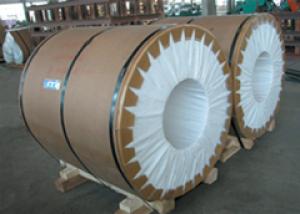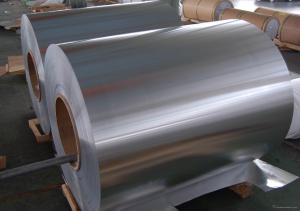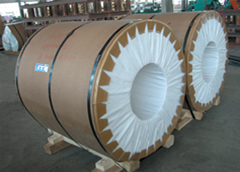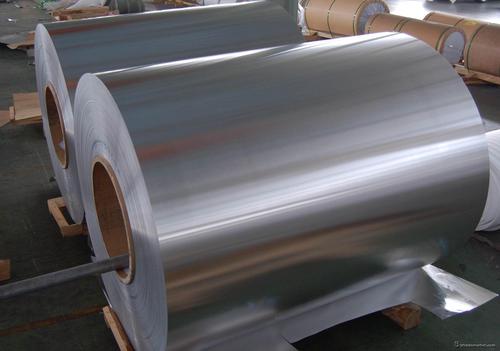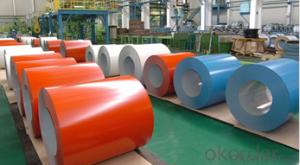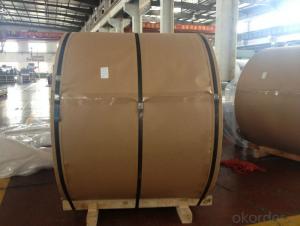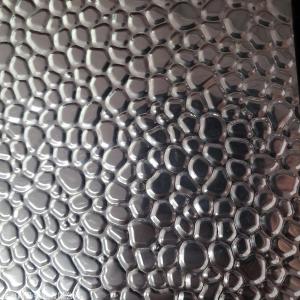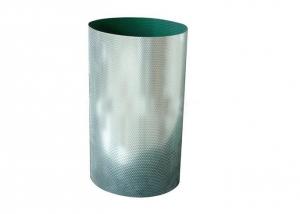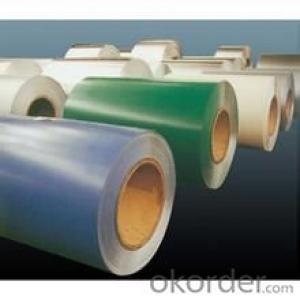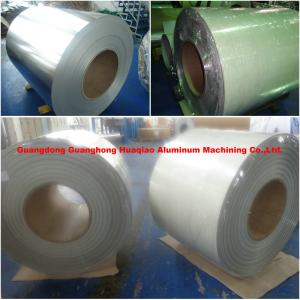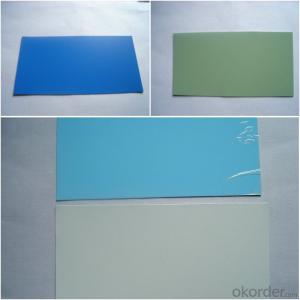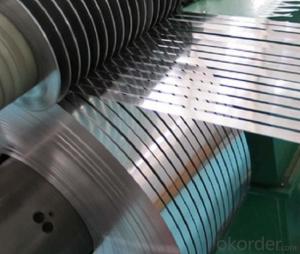Smooth Surface Embossed Aluminum Coil
- Loading Port:
- China Main Port
- Payment Terms:
- TT OR LC
- Min Order Qty:
- -
- Supply Capability:
- -
OKorder Service Pledge
Quality Product, Order Online Tracking, Timely Delivery
OKorder Financial Service
Credit Rating, Credit Services, Credit Purchasing
You Might Also Like
Alloy: AA 5052
Temper:H14/16/18/22/24/32,HO etc.
Thickness:0.2mm—100mm
Width:100mm—2300mm (Can be slitted)
InnerDiameter: 508MM
CoilWeight:500kg-3000kg(Max.)
Application: Foil stock, Circles, Roofing, Canstock, Marine plate,Anti-sliperypurpose in vehicles, packing and appliance.
- Q: Can aluminum coils be welded or joined?
- Aluminum coils have the capability to be welded or joined. Aluminum, being a highly weldable metal, can be easily joined through the utilization of different welding techniques. TIG welding, MIG welding, and resistance welding are the most commonly employed methods for welding aluminum coils. TIG welding is a precise and adaptable technique that employs a non-consumable tungsten electrode to generate the arc. This method is extensively utilized in welding aluminum coils due to its ability to offer exceptional control over the welding process, resulting in welds of high quality and strength. On the other hand, MIG welding employs a consumable wire electrode and a shielding gas to safeguard the weld zone from atmospheric contamination. This technique is faster compared to TIG welding and is often favored for larger production runs. Resistance welding is yet another prevalent method employed for joining aluminum coils. It involves the passage of an electric current through the overlapping metal surfaces to generate heat and pressure, thereby creating a robust weld joint. This technique is commonly used in industries that require high-speed production. It is important to note that welding aluminum coils necessitates specific techniques and considerations due to the distinctive properties of the metal. Aluminum possesses a lower melting point and higher thermal conductivity than other metals, which can make the welding process more challenging. Proper cleaning, preheating, and the selection of suitable filler materials are crucial in achieving successful welds. To summarize, aluminum coils can be welded or joined using various techniques such as TIG welding, MIG welding, and resistance welding. However, it is imperative to adhere to proper procedures and take into account the specific properties of aluminum to ensure the creation of strong and dependable welds.
- Q: What are the safety measures one should take when using aluminum coils indoors?
- <p>When using aluminum coils indoors, it's crucial to ensure proper ventilation to prevent the buildup of gases that can be harmful if inhaled in large quantities. Always follow the manufacturer's guidelines for installation and operation. Keep the coils away from flammable materials and ensure they are securely fastened to prevent tipping or falling. Regularly inspect the coils for any signs of damage or wear, and replace them if necessary. Never use aluminum coils in enclosed spaces without proper exhaust systems, and always have a fire extinguisher nearby in case of emergencies.</p>
- Q: Can aluminum coils be used for decorative purposes?
- Yes, aluminum coils can be used for decorative purposes. They are commonly used in various decorative applications such as trim work, wall panels, ceilings, and decorative accents. Aluminum coils offer versatility in terms of color, texture, and finish, allowing for creative and aesthetically pleasing designs.
- Q: Can aluminum coils be used in HVAC heat exchangers?
- Yes, aluminum coils can be used in HVAC heat exchangers. Aluminum is a popular choice for heat exchangers due to its excellent thermal conductivity, light weight, and corrosion resistance. Aluminum coils are often used in air conditioning systems and heat pumps, where they transfer heat efficiently between the refrigerant and the surrounding air. Additionally, aluminum coils are easier to shape and form, allowing for more intricate designs and better heat transfer performance. Overall, aluminum coils are a reliable and effective choice for HVAC heat exchangers.
- Q: What are the common surface finishes for aluminum coils in the automotive industry?
- The common surface finishes for aluminum coils in the automotive industry include mill finish, painted finish, anodized finish, and laminated finish.
- Q: I was at an art festival and saw one of the most unique displays ever. The artist had painted abstract art on a piece of aluminum (or some type of aluminum type sheeting) I, being a novice artist for many years, was very intrigued and would LOVE to learn more about it. I've done searches on the internet, to no avail. Anyone have any ideas?
- I've known a couple of people who do this, you might try a search on Floating Panel. You could try to search out things on an artist called Gary Hume, as I know that his earlier paintings, certainly the ones for which he's known, were executed on aluminium. From what I remember of people doing this (some one on my MA made paintings on aluminium) the trick is in the priming, it being a non-pours surface. You need to rough the ground considerably and prime quite thickly. You also need to baton on the back, this will allow you to attach to the wall without ruining the face of the support, and prevent the possibility of warping. What looks great is if you recess the batons from the edge of the support, so that when against the wall they cannot be seen, this gives the appearance of hovering, and shows the thinness of your support. Another reason you might not be getting too many hits on your searches is the spelling, while not incorrect you might find art suppliers using the English, rather than the American spelling; aluminium rather than aluminum. I know that sounds petty but it might make a difference. The only other thing I know, while finding it a great surface to work on, smooth, bright, the artist I know also found it very expensive.
- Q: Are there any specific certifications or qualifications required for aluminum coil suppliers?
- Yes, there are specific certifications and qualifications required for aluminum coil suppliers. These may include ISO certifications, quality management systems, and adherence to industry standards such as ASTM (American Society for Testing and Materials) or EN (European Norm) specifications. Additionally, suppliers may be required to meet certain regulatory requirements, such as those related to environmental sustainability or occupational health and safety.
- Q: Are there any limitations on the embossing of aluminum coils?
- Yes, there are limitations on the embossing of aluminum coils. The main limitations include the thickness and temper of the aluminum, as well as the complexity and depth of the desired embossing pattern. Additionally, the embossing process may affect the overall flatness and surface quality of the aluminum coil.
- Q: I am looking for a place where I can have my aluminium channels anodized in Erode.
- KSR Agency Products Services Aluminum AnodisingAluminum ExtrusionsArchitectural GlassesBus BarComposite Panels Elevation Glass FittingsFalse CeilingHeat Sink Sections About Us KSR Agency is well-known, veteran-owned business enterprise. Our company is a promising manufacturer and supplier of wide range of Aluminum Extrusion channels and Anodizing Aluminum that includes the following products o Glass Fittings for Elevation o Bus Bars o Heat Sink Sections o Aluminum Extrusions o Architectural Glasses o False ceiling o Partitions o Composite Panels Our Anodizing methodologies: o Type I - Chromic Acid Anodize o Type II - Sulphuric Acid Anodize o Type III - Hard Anodize o Class 1 - Non-dyed o Class 2 - Dyed Our range of products has huge demand and widely accepted by many people all across for their outstanding features and are available in various patterns, designs, sizes, shapes. We use the best grade raw material and advanced methods of production in the process of manufacturing these products. Our products meet the international standards in quality that assures excellent performance in usage and customized as per the clients' specification and necessity. We deliver the orders within a stipulated time frame. Contact Details KSR Agency No. 45, Mudali Thottam, Bharathi Nagar, Sulai, Chittode Road, Erode - 638004, Tamil Nadu, India Mr. Sendhil Kumar +(91)-9739956109 Mr. Rajendran +(91)-9842876614
- Q: The user is asking if it's possible to recycle old aluminum coils to create new ones.
- <p>Yes, you can recycle old aluminum coils into new ones. Recycling aluminum is a highly efficient process, and it's very common in the industry. Aluminum has one of the highest recycling rates among metals due to its value and the energy savings associated with recycling compared to producing new aluminum from raw materials. When you recycle aluminum, it can be melted down and reformed into new coils or other products without losing its properties. This process helps conserve resources and reduces environmental impact.</p>
Send your message to us
Smooth Surface Embossed Aluminum Coil
- Loading Port:
- China Main Port
- Payment Terms:
- TT OR LC
- Min Order Qty:
- -
- Supply Capability:
- -
OKorder Service Pledge
Quality Product, Order Online Tracking, Timely Delivery
OKorder Financial Service
Credit Rating, Credit Services, Credit Purchasing
Similar products
Hot products
Hot Searches
Related keywords
